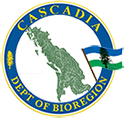Birthing BLC’s: Cascadia Regional Organizing Call
WAThis is a space for everyone within the bioregion to come together with others to start to create a shared identity across our bioregion, and have learning exchanges. This series of meetings supports the Birthing BLCs learning journey and will be held every other Thursday at 9:30 am in the off weeks. There will be opportunities for design discussions around material in the learning journey webinars. We’ll also share updates and can have some breakouts into Cascadia bioregions. The #Cascadia bioregion is a system of 75 distinct ecoregions – brought together by the Columbia, Fraser, and Snake watersheds, and a growing bioregional identity that strives to nurture a regenerative culture for the future of our planet. Sitting along the Northeastern Pacific rim of Northern America, Cascadia stretches or 2,500 miles (4,000 km) from the Copper River in Southern Alaska, to Cape Mendocino, approximately 200 miles north of San Francisco, and east as far as the Yellowstone Caldera and continental divide. It encompasses all of the state of Washington, all but the southeastern corner of Idaho, and portions of Oregon, California, Nevada, Utah, Wyoming, Montana, Alaska, Yukon, and British Columbia. About 18 million people call Cascadia home. If you’re one of them, we’d love to meet you! Brandon Letsinger and Clare Attwell, part of the Regenerate Cascadia core team, will hold the process with regular sharings from some of the current prototyping in RC and including emergent structures and processes resulting from the Cascadia Bioregional Activation tour (you can still view session recordings from this six-day event featuring local and international speakers). However, this space is for you! It nurtures connections between all of us and supports and empowers your work. No connection to RC is needed or asked, but those who would like to help us develop our processes as we join this learning journey are also welcome. We’ll all practice fractally scale-linking within our bioregion and with other bioregions across the continent and planet, as well as opportunities for connection and collaboration. Join us to explore the possibilities! #Cascadia #Bioregions #Bioregionalism






